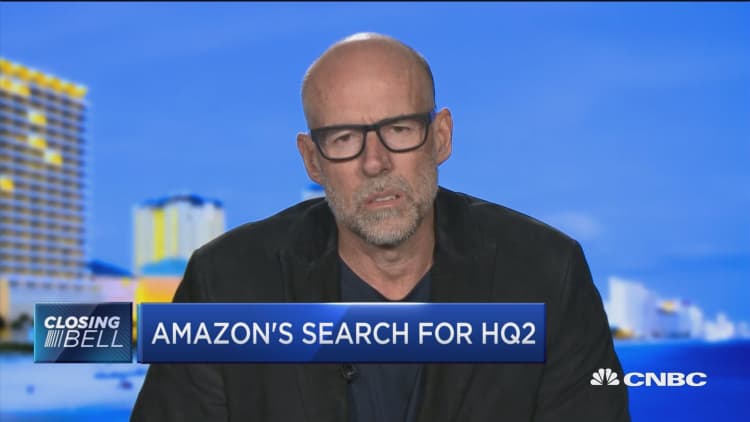Amazon's much publicized search for a second headquarters has earned a great deal of media attention for not only the e-comerce giant but for the cities offering bold concessions and pandering in their desperate attempt to house HQ2.
Wherever Amazon chooses to build, the company claims it will contribute $5 billion and create 50,000 jobs to the local economy. Mayors' bids to attract HQ2 were so common that they populated a whole YouTube subgenre last fall, back before the 230 applicant cities had been whittled down to 20 cities in January.
All of this has served the company's marketing strategy very well: Everyone is talking about Amazon. Yet the days of creating a massive, centralized campus in a major city are almost over. And that's not only okay, it's wonderful — if we approach it the right way.
These days there are more options to successfully run a decentralized or distributed workforce than ever before and reach workers where they want to live. Enterprise companies posted more than 30,000 jobs for freelancers on Upwork's platform last year. They didn't care where the freelancers were. They just wanted people with the skills to get the work done.
'Welcome to the new world of work'
It's highly likely Amazon will choose a city that's already prospering, like D.C. or Toronto or Los Angeles. My bet's on D.C. Who knows. At the end of the day, we do know that Amazon is going to choose one of only 20 predictable North American cities: an area where a large enough pool of skilled workers already lives and where that talent wants to stay. Thanks to technology untethering skilled workers, people today have an increasing amount of say in where they choose to live versus where they need to go to find a job.
What do I mean by this? Meet Brad Martin.
After studying architecture at the University of Missouri and then moving to St. Louis, Missouri, Martin got into virtual reality and augmented reality design and development. It's a coveted skill set, just not one that's in demand in his own backyard. With few job options in Missouri, Martin's job search ended up generating four job offers — all in big cities on the coasts. Problem was, Martin didn't want to move.
Fortunately for him, he didn't have to. A New York-based company made him a deal, allowing him to work remotely, and he took it. At the same time, his flexibility permitted him to do some freelance jobs on the side. Boosted by good reviews from his clients, Martin's work snowballed, giving him enough work to leave his job and freelance full-time, ultimately launching Another Reality Studio, a virtual reality development agency.
We've been talking about [telecommuting] since the first dot-com boom, if not the first rotary phone. But the knowledge economy's growth and the rise of mobile technology has sharply accelerated the trend. Between 2005 and 2015, the number of full-time telecommuters increased 115 percent.
Martin's only one example, but his experience speaks to the bigger picture. He didn't have to move away from the Midwest to earn a living — technology gave him options. Martin chose where he wanted to live and then shaped his work around that choice. Welcome to the new world of work.
To be sure, telecommuting is not new. We've been talking about it since the first dot-com boom, if not the first rotary phone.
But the knowledge economy's growth and the rise of mobile technology has sharply accelerated the trend. Between 2005 and 2015, the number of full-time telecommuters increased 115 percent, according to Global Workplace Analytics' 2017 study.
Another trend in work increasing location-independence is freelancing. The freelance workforce grew three times faster than the overall U.S. labor force between 2014 through 2016, a rate of growth suggesting the majority of American workers will freelance within a decade, according to Freelancing in America 2017.
Looking ahead, there is good reason to believe that workers will have more freedom to work where they want to live, instead of living where they have to work.
For starters, the people doing the hiring predict it.
Five times as many hiring managers expect that more of their team will work remotely over the next decade than the number expecting less, according to the 2018 Future Workforce Report. Of course, the shifting nature of our economy away from an industrial one and toward a cognitive, creative one has greased the wheels of all of this.
Flexibility is key
More flexibility is also the preference of workers — particularly highly skilled technical professionals and in-demand younger generation workers, who are accustomed to doing everything more online than in person. For these younger generations, there will be no need for terms like "digital nomads"; location independence will be the norm. In fact, data from Freelancing in America revealed that 81 percent of millennial freelancers agree that they freelance to be able to work where they want, topping the list of reasons millennials freelance.
And there's another main reason: America's biggest, mostly coastal cities are bursting at the seams. They're choking on their own "success." The growth of the tech industry has brought new wealth and prosperity to a few of our cities, but those same places have also seen their ways of life disrupted. More traffic isn't the half of it; it's the spike in the cost of living, particularly housing, which has become unaffordable to greater and greater shares of Los Angeles, San Francisco, San Jose, Seattle and New York.

It's why some big city leaders, like San Jose's mayor, hope Amazon doesn't come to their towns.
In fact, in March the New York Times reported that in the last three months of 2017, San Francisco lost more residents to other cities than any other in the country. And the Times wrote, "In recent months, a growing number of tech leaders have been flirting with the idea of leaving Silicon Valley," citing, in large part, the cost of living there.
More from @Work:
Facebook data scandal makes it more likely Zuckerberg wants to hire you
The suddenly hot job market for workers over 50
AT&T's retraining nearly half its workforce for jobs of the future
The hype will fade long before the construction dust settles on HQ2. And for the city that "wins" the project, buyer's remorse will follow. But we aren't predestined to repeat the bursting-at-its-seams cycle of Silicon Valley-led development. Savvy cities and leaders already are realizing that pursuing HQ2 or projects like it is an increasingly misguided approach.
As more come to that realization, they will reshape their cities around creating sustainable and livable communities — think more affordable housing, less traffic, fewer big city towers and more working options, like co-working spaces closer to homes. The cities that get it and plan accordingly will ultimately win the real battle — the fight for talent, not headquarters.

— By Stephane Kasriel, CEO of freelance platform Upwork





